Nadesalingam, Priya, Kopiga and Tharunicaa were given a five-day reprieve – then moved to Christmas Island
The officers came in the early morning.
On 5 March last year, Australian Border Force officers accompanied by Serco guards stormed the modest Biloela home of Tamil husband and wife Nadesalingam and Priya, and their two Australia-born daughters Kopiga, 2, and Tharunicaa, then just nine months old.
Given 10 minutes to pack, they were bundled into separate cars and driven to Gladstone airport and flown to Melbourne, 1,500km away.
They have not known a day’s freedom since.
Their ongoing case – and their dramatic reprieve from deportation in the early hours of Friday morning
– has consistently raised concerns about Australia’s onshore processing
of refugee claims, over delays and care in the system, and of moral
obligation to children born in this country to asylum seeking parents.On 5 March last year, Australian Border Force officers accompanied by Serco guards stormed the modest Biloela home of Tamil husband and wife Nadesalingam and Priya, and their two Australia-born daughters Kopiga, 2, and Tharunicaa, then just nine months old.
Given 10 minutes to pack, they were bundled into separate cars and driven to Gladstone airport and flown to Melbourne, 1,500km away.
They have not known a day’s freedom since.
On Thursday, the family was on board a Skytraders jet, privately chartered by the Australian government to Colombo, when a late-night court injunction in the family’s favour saw the plane land at Darwin, and the family disembarked. They have since been moved – in the middle of the night Friday – to Christmas Island.
The court injunction – now only applying only to the youngest daughter – has been extended to Wednesday at 4pm.
A sprawling community and online social movement, under the banner of #hometobilo, has spanned the country, and united such unlikely political bedfellows as Alan Jones and Kristina Keneally. Supporters of the family have held vigils outside courthouses, protested at airports and offices of airlines, and blocked politicians’ offices with sit-ins and inundated their staff with phone calls.
But the chances of government intervention appear slim.
Multiple sources have indicated to the Guardian that the immigration minister, David Coleman, is inclined – one source said “committed” – towards allowing the family to stay, but that he has been consistently overruled by the senior minister in the department, the home affairs minister, Peter Dutton, who is adamant the family has extinguished its appeal avenues and must, by law, leave the country. A spokeswoman for Minister Coleman said this was not correct.
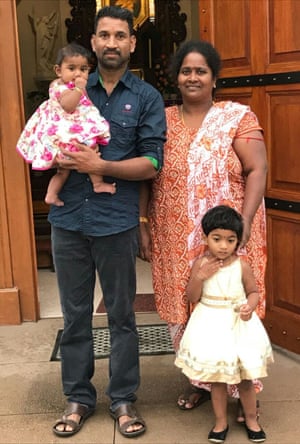
The court will decide on Wednesday.
The argument before the federal court is that no assessment has been made of youngest daughter Tharunicaa’s claim for protection, and that her best interests have not been considered.
Priya fled Sri Lanka earlier, in 2000, as civil war raged across the country: she told authorities in her protection claim that her fiance and five other men from her village were burned alive. She initially fled to India, not a refugee convention country and which does not offer protection, with family members. She arrived in Australia, also by boat, in 2013.
But both Nadesalingam and Priya had their claims for protection rejected by the department of immigration and border protection. Similarly, appeals before the administrative appeals tribunal, and the federal and high courts, have been rejected.
But in the meantime, living in Australia on the uncertainty of time-limited bridging visas, the pair met and fell in love. They settled in Biloela, a central Queensland town of about 6,000 people – and married in 2014. Their first daughter was born two years later.
After four years in Biloela, the family had become integral parts of the community. Nadesalingam worked at the town’s meatworks and volunteered at St Vincent de Paul.
Neighbours said Nadesh – as he was known – helped them with home renovations, while Priya and the children were active in community and daycare groups. Priya regularly made curries for staff at the local hospital.
While they built a life, and a community in Australia, their cases continued through Australia’s refugee status determination process. They were rejected for protection at every stage.
By March last year, Nadesalingam’s avenues for appeal had been extinguished.
Priya’s bridging visa to remain in the country expired on 4 March but she was in regular communication with a case worker from the Department of Home Affairs before that date to have it renewed. She said she had been told she would be receiving a new visa by mail from the department.
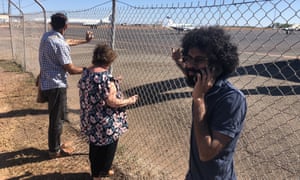
Held in Melbourne for nearly a year-and-a-half, the family has had a deeply traumatic time in detention.
The family has spent months in isolated rooms without access to outside or other people.
Medical reports have shown both girls have suffered severe vitamin deficiencies, as well as behavioural and other medical issues. Tharunicaa has suffered painful infections in her teeth which have been inadequately treated, with delays in getting appointments, and a failure to provide medication.
Victorian children’s commissioner, Liana Buchanan, said Tharunicaa’s was a “distressing case”, and her lack of adequate care “hard to fathom”. She said photos of Tharunicaa’s blackened teeth showed “clearly a child in pain”.
Medical reports showed both children displaying “behavioural disturbance” caused by their long-term detention. One child bit her own hands repeatedly, another displayed attachment issues and disorganised play. Doctors said the detention conditions were not appropriate for children, reporting the family was isolated and there were not other children for the girls to play with. They had no playgroup or early childhood learning.
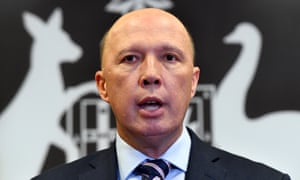
Late on Thursday, the family was taken to Melbourne airport where they were placed on a jet chartered by the Australian government to take them to Sri Lanka. The Australian-born children had never left the country.
Priya said she was not allowed to sit with her daughters, despite Tharunicaa reportedly crying uncontrollably.
With the flight in-air, a last-ditch legal injunction was sought – and ultimately granted – in the federal court. The plane was landed in Darwin, and the family taken from the airport to guarded accommodation.
On Friday afternoon, the family was returned to Darwin airport and sequestered away from members of the general public.
In scenes reminiscent of the war-scarred country they fled, the family was driven to the airport in a white van – notoriously, the vehicles used to “disappear” people in Sri Lanka – and held incommunicado, without access to phones or outside help.
With speculation the family had been flown back to Melbourne, or separated, with some members deported, for several hours, the family’s friends, legal counsel and supporters found themselves in the extraordinary situation of not knowing where any of the family were.
On Friday, the family was able to make contact with friends, telling them they were being held in Darwin. The Guardian was told the government had given a commitment to the family’s lawyers that family members will not be separated. It was expected the family would remain in Darwin until the court hearing Wednesday.
However, late on Friday, the family was flown to Christmas Island, landing on the remote Australian territory at 1am. Having had their phones taken from them on the journey, Priya was able to make a phone call to friends at about 2:30am. Supporters and legal counsel were not told the family would be taken from the mainland.
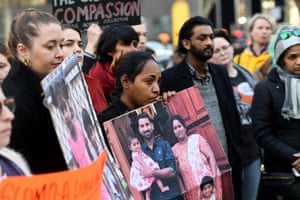
Dutton said on Friday the family were not refugees and they had no legal right to stay in Australia.
“I would like the family to accept that they are not refugees, they’re not owed protection by our country,” the home affairs minister told Nine’s Today program on Friday.
He said the couple was told before they had children that they would never be allowed to settle in Australia, and no court or tribunal had ever supported their case to stay.
“They came here by boat and we’ve been very clear that they wouldn’t stay.”
Australia is bound by international law to consider the best interests of the children in its decision-making, and family unity is a fundamental principle in international and Australian domestic law.
Australia is a party to the convention on the rights of the child, which states that children have a right to know and be cared for by their parents, and should grow up in a family environment wherever possible. It is also a party to the international covenant on civil and political rights, which says the family is the natural and fundamental group unit of society and is entitled to protection by society and the state.
Advocates for the family say it is within the government’s bailiwick to grant freedom to the family, given their exceptional circumstances, and the fact the children know no life other than Australia.
“Minister Dutton, should he wish, can secure the future of this young family with the stroke of a pen,” Tim O’Connor from Amnesty International told the Guardian.
“The extraordinary powers Minister Dutton has secured in his position as home affairs minister and as the senior minister in the department, include the powers of ministerial intervention, which specifically stipulate exceptional circumstances, including compassionate circumstances, which in our clear view, the situation of these two young girls and their family meets.”
Friends in Biloela want their neighbours back.
“In the 24 hours since they were served the deportation notice, the emotional swing that has occurred in this community has been extraordinary,” friend Angela Fredericks told the Guardian from Biloela, “from the extreme despair and grief of last night to the rage today. I’ve never seen a rage like that in Biloela. We’re a polite town.”
Fredericks said she hoped those ministers with the power to decide the family’s fate might use the five days until the next court hearing to reconsider the government’s position.
“We implore them to do some soul-searching. This should be showing what Australia is made of.”
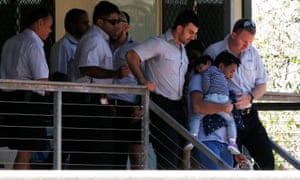
No comments:
Post a Comment